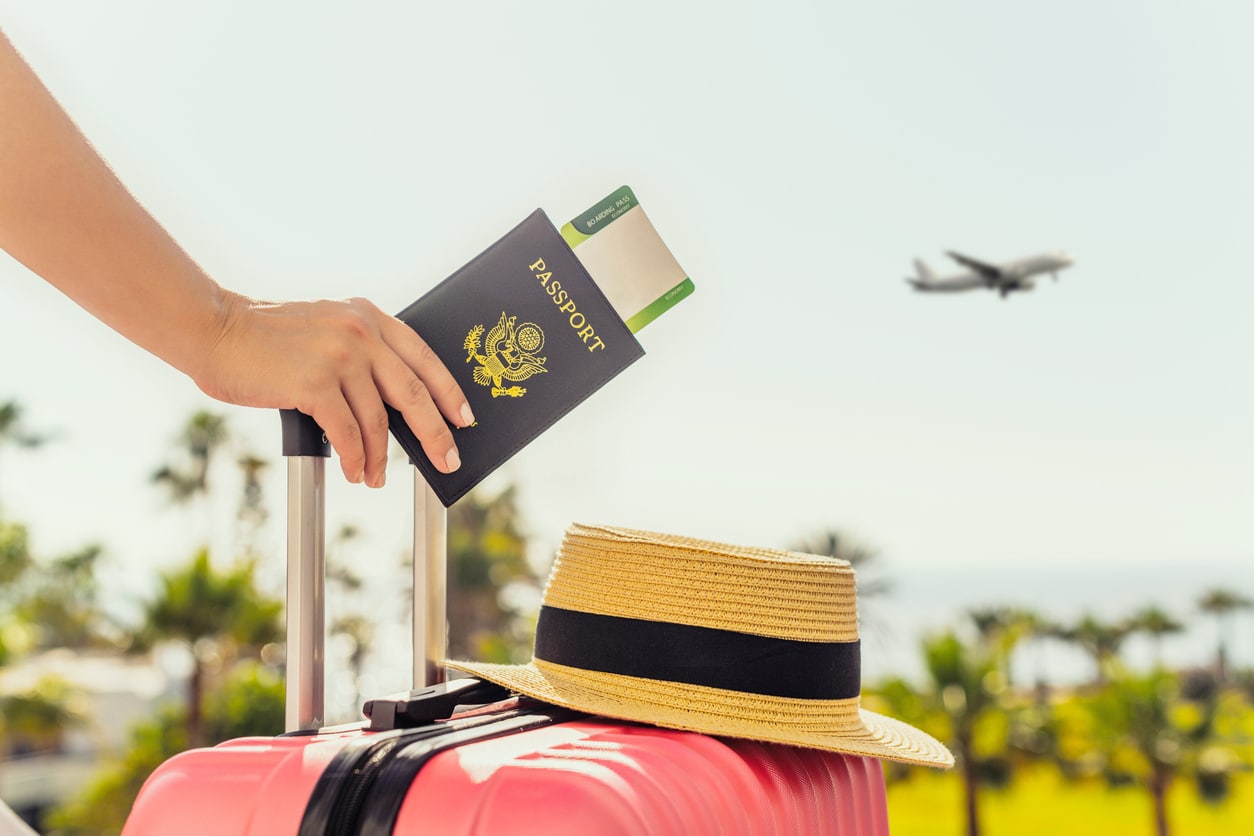Digital Nomad Visa Countries (2026): Your Tax-Smart Guide for Americans Working Abroad

As we kick off 2026, the “Golden Age” of remote work is reaching a new peak. With over 75 countries now offering dedicated pathways for location-independent professionals, the biggest challenge will be choosing a destination that aligns with your lifestyle and your 2026 financial goals.
For Americans, 2026 brings a significant tax win: The IRS has officially raised the Foreign Earned Income Exclusion (FEIE) to $130,000. This means your journey into 2026 could be your most profitable year yet.
What Are Digital Nomad Visas and Why Do They Matter for Taxes?
Digital nomad visas are special permits that allow remote workers to live legally in foreign countries for extended periods, typically 6 to 12 months, sometimes longer. Unlike tourist visas that restrict work activities, these programs specifically welcome location-independent professionals.
For tax purposes, these visas create opportunities to establish foreign tax residency, potentially qualify for the Foreign Earned Income Exclusion, and access Foreign Housing Exclusion benefits. The key is choosing programs that align with your income level, tax strategy, and lifestyle preferences.
Which Digital Nomad Visa Countries Offer the Best Value in 2026?
Here are the top 12 digital nomad visa programs that balance opportunity, affordability, and tax advantages for Americans:
1. Philippines – The Archipelago’s New Chapter
- Status: Fully operational following its 2025 launch.
- Income Requirement: $24,000 USD/year ($2,000/month).
- The Vibe: Ideal for those seeking a tropical, English-speaking environment with a low cost of living.
- Key Detail: The 12-month visa is extendable for another year, and foreign income remains tax-exempt locally.
2. Greece – The Mediterranean Work-Life Balance
- Income Requirement: €3,500/month (approx. $3,850).
- The Draw: One of the most straightforward paths into the EU. You can apply at a consulate or even online if you are already in the country on certain permits.
- Tax Incentive: Greece offers a 50% income tax reduction for up to seven years for those who move their tax tax residence to the country (subject to specific conditions).
- Read our complete guide to the Greece Digital Nomad Visa.
3. Thailand – Destination Thailand Visa (DTV)
- Duration: 5 years (Multiple entry).
- Financial Req: Proof of 500,000 THB (~$14,500 USD) in savings.
- Why It’s Winning: It remains the most flexible visa in Asia for 2026, allowing 180-day stays that can be easily extended.
- Learn the details, benefits, and requirements for Thailand’s Digital Nomad Visa
4. Spain – The Cultural Powerhouse
- Income Requirement: €2,760/month (approx. $3,050).
- Benefit: A clear path to permanent residency and the ability to travel freely through the Schengen Area. The 5-year renewal option creates long-term planning opportunities for the Foreign Earned Income Exclusion. Americans living in Spain can benefit from the country’s progressive tax system and favorable treaties, and the official application process through Spanish consulates worldwide has become increasingly streamlined.
5. Japan – The “Six-Month Sprint”
- Income Requirement: ¥10 Million (~$66,000 USD/year).
- The Catch: It is strictly limited to 6 months and non-renewable, making it a perfect “bucket list” stay for high-earning nomads. Read our complete guide on Japan’s Digital Nomad Visa.
6. Italy – For the Highly Skilled
- Income Requirement: €28,000/year (approx. $31,000).
- Who it’s for: Specialized professionals who can prove they belong to a “highly functional” professional category.
7. Portugal – The Digital Nomad Veteran (D8)
- Income Requirement: €3,480/month.
- Status: Despite changes to older tax schemes, the D8 remains the premier gateway for those wanting to settle long-term in Western Europe. The country’s tax system for American expats includes attractive Non-Habitual Resident benefits, and you can apply through Portugal’s official visa portal or Portuguese consulates worldwide.
8. Costa Rica – Rentista Visa
- Income Requirement: $3,000/month.
- Benefit: Zero local income tax and zero import tax on your workstation/equipment. Costa Rica’s proximity to the US and mature expat infrastructure make tax compliance and communication easier. The country’s territorial tax system provides attractive benefits for American nomads, and applications can be submitted through Costa Rica’s immigration authority.
9. Croatia – The Coastal Retreat
- Income Requirement: €2,870/month.
- The Perk: A 12-month stay with a total exemption from local income tax.
10. Taiwan – The Tech Nomad’s Hub
- Requirement: Proof of remote employment; specialized “Gold Card” for those in tech, law, or science.
- Benefit: Unmatched safety and world-class digital infrastructure.
11. Estonia – The E-Governance Pioneer
- Income Requirement: €4,500/month.
- Vibe: Perfect for entrepreneurs who want to manage an EU business entirely online.
12. South Africa – The Newcomer
- Highlight: A massive 2025 push has made Cape Town one of the top-ranked nomad cities for early 2026.
- Income Requirement: ZAR 1,000,000/year (~$54,000 USD).
How Do I Qualify for the Foreign Earned Income Exclusion as a Digital Nomad?
The Foreign Earned Income Exclusion is your biggest tax advantage as a digital nomad. To qualify, you must pass either the Physical Presence Test or the Bona Fide Residence Test.
- Physical Presence Test: Spend 330+ days outside the US during any 12-month period. This test works perfectly for nomads who frequently move between countries.
- Bona Fide Residence Test: Establish genuine residency in a foreign country for a full calendar year. Digital nomad visas help demonstrate this intent.
For 2025, you can exclude up to $130,000 of foreign earned income using Form 2555. If you qualify for the entire year and earn less than this amount, your federal tax bill could be $0.
Do I Still Need to File US Taxes While on a Digital Nomad Visa?
Yes, absolutely. As a US citizen, you must file a Form 1040 regardless of where you live or work. However, filing doesn’t mean owing taxes.
Here’s what you’ll typically need to file as a digital nomad living abroad:
- Form 1040: Your main tax return
- Form 2555: To claim the Foreign Earned Income Exclusion
- Form 1116: To claim the Foreign Tax Credit (if paying foreign taxes)
- FBAR (FinCEN Form 114): If you have $10,000+ in foreign accounts
- Form 8938: If foreign assets exceed certain thresholds
The key is reporting all income first, then applying exclusions and credits. Most nomads end up owing nothing when filed correctly.
Stop guessing. Download the expert guide now.
"*" indicates required fields

What About Foreign Bank Accounts and Reporting Requirements?
Digital nomads often need local bank accounts for rent, utilities, and daily expenses. If your foreign accounts total $10,000+ at any time during the year, you must file an FBAR by April 15 (with automatic extension to October 15).
The FBAR is purely informational—it doesn’t create additional taxes. However, the penalties for not filing can be severe, up to $12,500 per violation.
You may also need to file Form 8938 if your foreign assets exceed certain thresholds based on your filing status and location.
Which Countries Should I Avoid or Consider Carefully?
While our top 10 offer excellent value, the digital nomad visa landscape includes dozens of other programs with varying benefits and drawbacks. Here’s your comprehensive guide to making informed decisions:
Strong Programs Worth Considering
Norway – Independent Contractor Visa Norway’s 2-year visa with indefinite renewal potential offers exceptional long-term stability. However, the $37,723 annual income requirement and high cost of living make it suitable only for high earners. After three years, the pathway to permanent residency creates excellent tax planning opportunities for Americans familiar with Norway’s complex tax system. Applications are processed through Norwegian immigration authorities.
Malta – Nomad Residence Permit Malta’s program provides EU access with a reasonable $2,899 monthly income requirement. The 12-month renewable visa offers a strategic Mediterranean base with English as an official language. Malta’s favorable US tax treaties can provide additional benefits for American nomads. Details are available through Malta’s official immigration website.
Germany – Freelancer Visa Germany’s residence permit for self-employment targets creative professionals and tech workers. While more complex to obtain, it provides access to Europe’s largest economy and excellent infrastructure. The application process requires in-person submission and portfolio review, making it best suited for established freelancers. Americans can benefit from Germany’s comprehensive tax treaty with the US, and applications are processed through German diplomatic missions.
Dubai – Virtual Working Program Dubai’s tax-free jurisdiction offers significant advantages for high-income nomads, though the $5,000 monthly requirement and $287 application fee reflect its premium positioning. The one-year renewable program provides access to world-class infrastructure and a strategic Middle East location. Apply through Dubai’s official government portal.
Barbados – Welcome Stamp Despite the $2,000 application fee, Barbados offers excellent value for nomads seeking a Caribbean lifestyle. The program requires proof of $50,000 annual income and provides one-year renewable status with access to a well-established expat community. Applications are processed through Barbados immigration services.
Czech Republic – Živno Visa The Czech Republic’s program targets STEM professionals with its 12-month visa and $2,700 monthly income requirement. The university degree or three years of IT experience requirement makes it selective but valuable for qualifying applicants. Prague’s central European location provides excellent access to the broader EU market. Information is available through Czech diplomatic missions.
Emerging Programs to Watch
Slovenia (Launching Late 2025) Slovenia is preparing to join the EU digital nomad visa trend, likely offering 6-12 month renewable programs similar to neighboring countries. Early indicators suggest competitive pricing and reasonable income requirements for EU access. Updates will be available through Slovenia’s government portal.
New Zealand – Updated Visitor Rules. While not a formal digital nomad visa, New Zealand’s January 2025 update allows tourists to work remotely for up to 90 days, extendable to nine months. This provides an excellent testing ground for nomads considering longer-term relocation. Americans considering this option should understand New Zealand’s tax implications for US citizens and check current requirements through the US State Department’s travel advisories. Official information is available through New Zealand Immigration.
Additional European Options: Belgium, Netherlands, and Finland are all exploring digital nomad visa programs for 2025-2026. These programs will likely offer EU access with varying income requirements and duration options. Check Belgium’s official portal, Netherlands immigration services, and Finland’s immigration authority for updates.

Are You Ready to Move Abroad?
Choose the answer to each question that best describes you or your current situation, and learn how ready you are to start a life abroad.
Are You Ready to Move Abroad?
"*" indicates required fields

You have an adventurous spirit but you may need to prepare a bit more to ensure a smooth transition abroad. Consider researching more about the cultural, legal, and financial aspects of living overseas. Check out our guide 25 Thing Every Expat Should Know
You’re on the right track. You’ve started to think about what life abroad will entail. Keep building on your preparations to avoid any surprises once you’ve moved. Check out our guide 25 Thing Every Expat Should Know
You’re ready to move abroad! You seem well-prepared and have done your homework! You’re ready to embrace the expat life with confidence. Check out our guide 25 Thing Every Expat Should Know
Programs to Approach with Caution
Iceland – Long-Term Visa Iceland’s $7,550 monthly income requirement makes it one of the world’s most expensive digital nomad programs. While the 180-day duration and stunning scenery appeal to many, the high cost of living compounds the financial challenges. Consider this if you’re a very high earner with specific business reasons for an Iceland base. Applications are processed through the Icelandic Directorate of Immigration.
Antigua and Barbuda – Nomad Digital Residence The two-year program sounds attractive, but limited infrastructure and higher-than-expected living costs have disappointed some nomads. The $1,500 application fee and complex renewal process add additional friction. Information is available through Antigua and Barbuda’s immigration services.
Cayman Islands Programs Various programs target remote workers, but the extremely high cost of living and limited cultural diversity make these suitable only for particular circumstances. Living expenses that can exceed $6,000 monthly may offset tax benefits. Check the Cayman Islands government services for current offerings.
Tax Treaty Considerations
Some countries with digital nomad visas have complex tax treaties that could complicate your US filing obligations:
Countries with Favorable US Tax Treaties:
- United Kingdom (though no specific nomad visa) – benefits covered under US tax treaty provisions
- France (emerging programs) – comprehensive tax treaty benefits
- Germany (freelancer programs)
- Netherlands (exploring options) – strong tax treaty protections
Countries Requiring Extra Tax Planning:
- Brazil (no current treaty, though visa programs exist)
- Thailand (limited treaty benefits for most income types)
- Dubai/UAE (no income tax, but reporting requirements remain)
Red Flags to Avoid
- Programs Requiring Large Deposits: Some countries require substantial bank deposits that tie up capital without providing proportional benefits. Always calculate the opportunity cost of locked funds against program benefits.
- Countries with Unstable Political Situations: Check current US State Department travel advisories before committing to any program. Political instability can disrupt visa renewals and create tax complications.
- Programs with Unclear Tax Implications: Avoid programs that don’t clearly specify tax obligations or those in countries without established expat tax guidance. Uncertainty in tax planning can be costly.
- High-Maintenance Renewal Requirements: Some programs require frequent in-person renewals, extensive documentation updates, or unclear criteria that make long-term planning difficult.
Making Your Decision
When evaluating any digital nomad visa program, consider:
- Total Cost of Living: Application fees are just the beginning. Factor in housing, healthcare, transportation, and daily expenses.
- Tax Implications: Research both local tax obligations and how the program affects your US tax strategy. The IRS Publication 54 provides essential guidance for US citizens abroad.
- Infrastructure Quality: Reliable internet, healthcare access, and banking services are essential for productive remote work.
- Renewal Complexity: Understand the long-term commitment and renewal requirements before applying.
- Exit Strategy: Ensure you can easily transition to other programs or return to the US if circumstances change.
Regional Strategies
- European Union Access: If EU access is your priority, focus on Spain, Portugal, Estonia, or Croatia for the best combination of value and benefits. The Schengen Area allows free movement between 27 countries once you have a valid residence permit.
- Asia-Pacific Hub: Thailand’s five-year DTV offers unmatched long-term stability in Southeast Asia, while Taiwan provides excellent infrastructure for tech professionals.
- Americas Proximity: Costa Rica and Mexico offer the shortest flight times to the US, which is necessary for family visits or business travel.
- Tax Optimization: For pure tax benefits, consider territorial tax countries like Costa Rica, Panama, or Singapore (though Singapore doesn’t have a formal nomad visa yet).
The key is aligning your choice with your specific income level, career goals, and lifestyle preferences while maintaining a tax-efficient structure that supports your long-term financial objectives.
How Can I Minimize My Tax Burden While Maximizing My Nomad Experience?
Thoughtful tax planning starts before you leave the US:
- Time your departure strategically to maximize Foreign Earned Income Exclusion benefits in your first year abroad
- Choose countries wisely based on your income level and tax situation
- Keep detailed records of travel dates, expenses, and foreign tax payments
- Consider the Foreign Housing Exclusion if your housing costs exceed $20,800 annually
- Plan for state tax issues before leaving, especially from high-tax states like California
Remember, you can combine the Foreign Earned Income Exclusion with the Foreign Tax Credit strategically—use FEIE for earned income and FTC for investment income or amounts above the exclusion limit.
What If I’m Behind on My Taxes?
Many nomads discover their filing obligations after they’ve been abroad for months or years. Don’t panic, the IRS offers penalty-free catch-up options through the Streamlined Filing Procedures for expats who file late, unintentionally.
This program allows you to file three years of tax returns and six years of FBARs without penalties, assuming your failure to file wasn’t willful.
Your Next Steps to Nomad Success
Digital nomad visas open incredible opportunities for Americans to work and travel, often with significant tax advantages. It is key to make informed decisions that align your lifestyle goals with thoughtful tax planning.
Before you apply for any visa:
- Calculate your potential Foreign Earned Income Exclusion savings
- Research the tax implications of your target countries
- Ensure you have systems in place for accurate record-keeping
- Consider consulting with a digital nomad tax specialist before making major moves
At Greenback Expat Tax Services, we’ve helped thousands of digital nomads file correctly and keep more of their hard-earned income. Our expat-expert CPAs and IRS Enrolled Agents understand the opportunities and complexities of nomadic tax situations.
Ready to make your nomad dreams a reality while staying tax-compliant? Contact us, and one of our customer champions will gladly help. If you need specific advice on your tax situation, click below to get a consultation with one of our expat tax experts.
This article provides general information about digital nomad visas and US tax obligations for educational purposes only and is not intended as personalized tax, legal, or immigration advice. Always consult with qualified tax professionals and immigration attorneys for advice specific to your situation, as tax laws and visa requirements change frequently and vary based on individual circumstances.



